GALLUP NEWS SERVICE
PRINCETON, NJ -- More Americans predict 2005 will be a year of economic difficulty for the United States than think it will be a year of prosperity. While nearly 7 in 10 Americans expect 2005 will be a troubled year internationally, a slight majority still believes the United States will increase its power in the world during that time. These predictions come from Gallup's final 2004 poll, conducted Dec. 17-19. Since 1959, Gallup has periodically asked Americans to make predictions about what will happen in the coming year.
Additionally, a recent Gallup poll finds the vast majority of Americans are satisfied with their personal lives as the new year begins. Slightly more than half of Americans also say they are "very happy."
2005 Predictions: The Economy
When asked which of two statements is more likely to be true of 2005, 44% of Americans say it will be a year of economic prosperity, while 54% say it will be a year of economic difficulty.
It is not uncommon for Americans to give pessimistic economic predictions, which are apparently strongly influenced by the state of the current economy. For example, when Gallup asked the question in the 1970s during sluggish economic times, most Americans predicted years of economic difficulty. On the other hand, at times when the economy was strong, such as in the mid-1960s and late-1990s, Americans thought the coming years would be prosperous.
Please tell me which you think is more likely to be true of 2005: A year of economic prosperity, or a year of economic difficulty.
|
Prosperity |
Difficulty |
No opinion |
||
|
% |
% |
% |
||
|
"2005" |
2004 Dec 17-19 |
44 |
54 |
2 |
|
|
|
|
||
|
"1999" |
1998 Dec 28-29 |
62 |
34 |
4 |
|
"1998" |
1998 Jan 16-18 |
59 |
37 |
4 |
|
"1979" |
1978 Dec 1-4 |
21 |
69 |
10 |
|
"1976" |
1976 Dec 10-13 |
34 |
54 |
12 |
|
"1976" |
1975 Dec 12-15 |
23 |
70 |
7 |
|
"1974" |
1973 Nov 30-Dec 3 |
7 |
85 |
8 |
|
"1973" |
1972 Nov 10-13 |
40 |
47 |
13 |
|
"1971" |
1970 Dec 3-8 |
18 |
73 |
8 |
|
"1970" |
1969 Oct 17-22 |
30 |
61 |
10 |
|
"1969" |
1968 Dec 5-10 |
38 |
48 |
15 |
|
"1968" |
1967 Dec 7-12 |
42 |
47 |
12 |
|
"1967" |
1966 Dec 8-13 |
43 |
45 |
13 |
|
"1966" |
1965 Dec 11-16 |
56 |
33 |
11 |
|
"1965" |
1965 Jan 7-12 |
65 |
22 |
13 |
Republicans and Democrats have very different expectations for the 2005 economy. Seventy-six percent of Republicans say it will be a year of prosperity, while 80% of Democrats say it will be a year of economic difficulty.
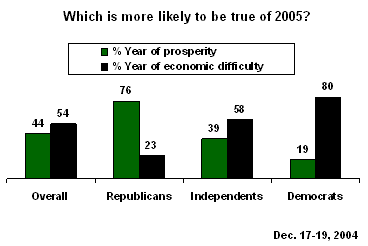
2005 Predictions: International Affairs
Looking beyond the United States' borders, 69% of Americans expect 2005 to be "a troubled year with much international discord," while 29% say it will be "a peaceful year, more or less free of international disputes."
Americans have also typically taken a pessimistic view in this regard -- only in 1959 did a majority of Americans predict that the coming year would be a peaceful year. However, the degree of pessimism is slightly higher in 2005 than in the past -- the 69% who feel 2005 will be a troubled year has only been surpassed twice, in Americans' predictions for the years 1966 and 1980. At this time, such a finding is not surprising given the ongoing war in Iraq.
Please tell me which you think is more likely to be true of 2005: A peaceful year, more or less free of international disputes, or a troubled year with much international discord.
|
Peaceful year |
Troubled year |
No opinion |
||
|
% |
% |
% |
||
|
"2005" |
2004 Dec 17-19 |
29 |
69 |
2 |
|
|
|
|
||
|
"1999" |
1998 Dec 28-29 |
27 |
69 |
4 |
|
"1998" |
1998 Jan 16-18 |
31 |
65 |
4 |
|
"1980" |
1979 Nov 30-Dec 3 |
14 |
80 |
7 |
|
"1979" |
1978 Dec 1-4 |
38 |
53 |
9 |
|
"1975" |
1974 Dec 6-9 |
29 |
61 |
10 |
|
"1974" |
1973 Nov 30-Dec 3 |
23 |
65 |
11 |
|
"1966" |
1965 Dec 11-16 |
11 |
82 |
7 |
|
"1965" |
1965 Jan 7-12 |
31 |
57 |
12 |
|
"1963" |
1962 Dec 13-18 |
38 |
53 |
9 |
|
"1960" |
1959 Dec 3-8 |
54 |
31 |
15 |
A majority of Republicans, Democrats, and independents all expect a troubled 2005, but Republicans are less likely to think so than are independents and Democrats.
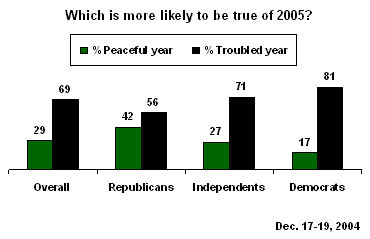
Americans give their most optimistic predictions in regards to the United States' position in the world. Just over half of Americans, 51%, say 2005 will be a year in which "America will increase its power in the world," while 44% say it will be "a year when American power will decline."
Despite the slight majority positive view, that still rates as one of the least optimistic assessments in the 15 times Gallup has asked this question. Less than a majority of Americans thought U.S. power would increase in the years 1974 and 1976; all other times, at least 53% expected a more powerful position for the United States.
Please tell me which you think is more likely to be true of 2005: A year when America will increase its power in the world, or a year when American power will decline.
|
Increase its power |
Power will decline |
No opinion |
||
|
% |
% |
% |
||
|
"2005" |
2004 Dec 17-19 |
51 |
44 |
5 |
|
|
|
|
||
|
"1999" |
1998 Dec 28-29 |
60 |
33 |
7 |
|
"1998" |
1998 Jan 16-18 |
55 |
37 |
8 |
|
"1980" |
1979 Nov 30-Dec 3 |
58 |
30 |
13 |
|
"1979" |
1978 Dec 1-4 |
53 |
33 |
15 |
|
"1977" |
1976 Dec 10-13 |
58 |
24 |
18 |
|
"1976" |
1975 Dec 12-15 |
43 |
44 |
14 |
|
"1974" |
1973 Nov 30-Dec 3 |
29 |
50 |
21 |
|
"1969" |
1968 Dec 5-10 |
62 |
21 |
17 |
|
"1968" |
1967 Dec 7-12 |
62 |
22 |
15 |
|
"1967" |
1966 Dec 8-13 |
66 |
20 |
14 |
|
"1966" |
1965 Dec 11-16 |
74 |
14 |
12 |
|
"1965" |
1965 Jan 7-12 |
64 |
19 |
17 |
|
"1963" |
1962 Dec 13-18 |
84 |
6 |
10 |
|
"1960" |
1959 Dec 3-8 |
73 |
10 |
17 |
Sixty-seven percent of Republicans say the United States will increase its power in the world in 2005, compared with 48% of independents and 37% of Democrats.
Americans' Personal Lives
As the new year begins, Americans remain positive in their assessment of their personal lives. According to Gallup's Dec. 5-8 poll, 84% of Americans are satisfied with the way things are going in their personal lives, including 58% who say they are very satisfied. Only 14% are dissatisfied.
At least 8 in 10 Americans have expressed satisfaction with their personal lives since 1993. In comparatively few instances since Gallup began asking this question in 1979 has the percentage satisfied dipped below the 80% mark. This has usually occurred at times in which there was a troubled national economy, such as in 1979 and 1992.
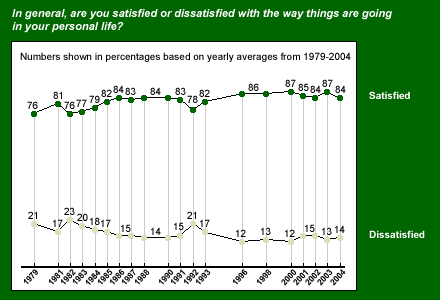
There is a definite relationship between personal satisfaction and income -- those living in households with higher income levels are much more likely to say they are satisfied with their personal lives than those living in lower income households. Still, at least 7 in 10 Americans at all income levels say they are satisfied.
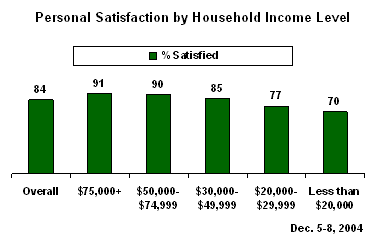
Additionally, 51% of Americans say that, generally speaking, they are "very happy." Forty-two percent say they are "fairly happy" and only 6% say they are "not too happy." That represents a slight decrease from 55% who said they were very happy in December 2003, the highest percentage Gallup had recorded to date for this measure. The current percentage remains above average by historical standards.
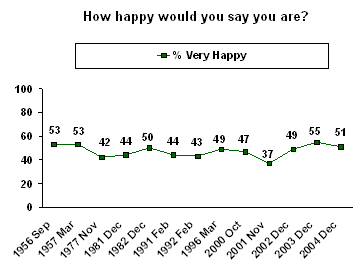
Just as is the case for personal satisfaction, there is also a relationship between household income and expressed happiness, with lower income respondents less likely than higher income respondents to say they are happy.
Survey Methods
These results are based on telephone interviews with randomly selected national samples of 1,002 adults, aged 18 and older, conducted Dec. 17-19, 2004 and 1,003 adults, aged 18 and older, conducted Dec. 5-8, 2004. For results based on these samples, one can say with 95% confidence that the maximum error attributable to sampling and other random effects is ±3 percentage points. In addition to sampling error, question wording and practical difficulties in conducting surveys can introduce error or bias into the findings of public opinion polls.
4. In general, are you satisfied or dissatisfied with the way things are going in your own personal life?
|
|
Satisfied |
Dissatisfied |
No opinion |
|
|
% |
% |
% |
|
2004 Dec 5-8 |
84 |
14 |
2 |
|
2003 Dec 11-14 |
88 |
11 |
1 |
|
2003 Jan 13-16 |
85 |
14 |
1 |
|
2002 Dec 5-8 |
83 |
16 |
1 |
|
2002 Jan 7-9 |
85 |
14 |
1 |
|
2001 Dec 6-9 |
84 |
15 |
1 |
|
2001 Jan 10-14 |
85 |
14 |
1 |
|
2000 Oct 6-9 |
87 |
12 |
1 |
|
1998 Dec 28-29 |
86 |
13 |
1 |
|
1996 Mar 8-10 |
86 |
12 |
2 |
|
1993 Dec 4-6 |
82 |
17 |
1 |
|
1992 Feb 28-Mar 1 |
79 |
20 |
1 |
|
1992 Jan 3-6 |
77 |
22 |
1 |
|
1991 Nov |
79 |
19 |
2 |
|
1991 Oct |
81 |
18 |
1 |
|
1991 Aug |
82 |
16 |
2 |
|
1991 Feb 28-Mar 3 |
87 |
12 |
1 |
|
1991 Feb 14-17 |
84 |
15 |
1 |
|
1991 Jan 17-20 |
86 |
12 |
2 |
|
1991 Jan 3-6 |
84 |
14 |
2 |
|
1990 Dec 13-16 |
82 |
18 |
* |
|
1990 Nov |
85 |
13 |
2 |
|
1990 Oct 25-28 |
87 |
11 |
2 |
|
1990 Oct 11-14 |
82 |
16 |
2 |
|
1990 Sep |
85 |
13 |
2 |
|
1990 Aug 30-Sep 2 |
86 |
12 |
2 |
|
1990 Aug 9-12 |
85 |
13 |
2 |
|
1990 Jul |
81 |
17 |
2 |
|
1990 Feb |
83 |
16 |
1 |
|
1988 Sep |
87 |
12 |
1 |
|
1988 May |
80 |
16 |
4 |
|
1987 Aug |
83 |
15 |
2 |
|
1986 Sep |
84 |
14 |
2 |
|
1986 Mar |
84 |
15 |
1 |
|
1985 Nov |
82 |
17 |
1 |
|
1984 Dec |
79 |
17 |
4 |
|
1984 Feb |
79 |
19 |
2 |
|
1983 Aug |
77 |
20 |
3 |
|
1982 Nov |
75 |
23 |
2 |
|
1982 Apr |
76 |
22 |
2 |
|
1981 Dec |
81 |
17 |
2 |
|
1981 Jun |
81 |
16 |
3 |
|
1981 Jan |
81 |
17 |
2 |
|
1979 Nov |
79 |
19 |
2 |
|
1979 Jul |
73 |
23 |
4 |
|
1979 Feb |
77 |
21 |
2 |
5. Are you very [satisfied/dissatisfied], or just somewhat [satisfied/dissatisfied]?
|
|
Very satisfied |
Somewhat satisfied |
Somewhat dissatisfied |
Very dissatisfied |
No |
|
|
% |
% |
% |
% |
% |
|
2004 Dec 5-8 |
58 |
26 |
9 |
5 |
2 |
|
2003 Dec 11-14 |
58 |
30 |
7 |
4 |
1 |
|
2003 Jan 13-16 |
58 |
27 |
9 |
5 |
1 |
|
2002 Dec 5-8 |
50 |
33 |
11 |
5 |
1 |
|
2002 Jan 7-9 |
56 |
29 |
9 |
5 |
1 |
|
2001 Dec 6-9 |
54 |
30 |
10 |
5 |
1 |
|
2001 Jan 10-14 |
56 |
29 |
10 |
4 |
1 |
6. Generally speaking, how happy would you say you are -- very happy, fairly happy, or not too happy?
|
|
Very happy |
Fairly happy |
Not too happy |
No opinion |
|
|
% |
% |
% |
% |
|
2004 Dec 5-8 |
51 |
42 |
6 |
1 |
|
2003 Dec 11-14 |
55 |
40 |
4 |
1 |
|
2002 Dec 5-8 |
49 |
44 |
6 |
1 |
|
2001 Nov 8-11 |
37 |
52 |
11 |
* |
|
2000 Oct 6-9 |
47 |
47 |
5 |
1 |
|
1996 Mar 8-10 |
49 |
46 |
5 |
* |
|
1992 Feb 28-Mar 1 |
43 |
47 |
9 |
1 |
|
1991 Feb 21 |
44 |
45 |
10 |
1 |
|
1982 Dec 10 |
50 |
43 |
6 |
* |
|
1981 Dec 11 |
44 |
51 |
5 |
* |
|
1981 Jun 5 |
46 |
43 |
10 |
1 |
|
1977 Nov 4 |
42 |
48 |
10 |
1 |
|
1957 Mar 5 ^ |
53 |
43 |
3 |
* |
|
1956 Sep 20 ^ |
53 |
42 |
5 |
* |
|
* Less than 0.5% |
||||
|
^ Third response category different wording: "or not very happy" |
||||
